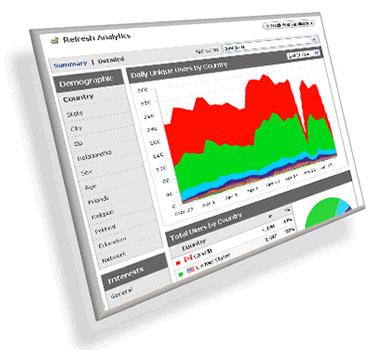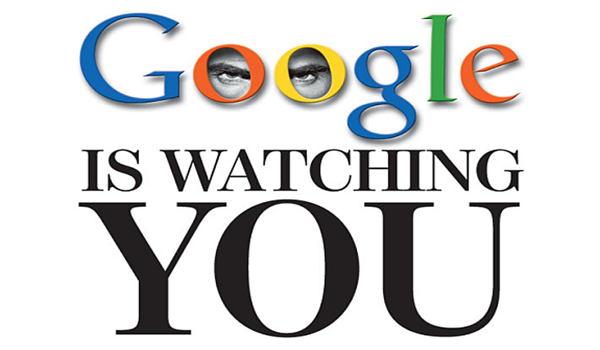By now, everyone in the tech world and beyond has heard about Google’s data collection from unsecured Wi-Fi networks in Germany.
What you may not have known, however, is that Google has been collecting detailed user data since day one. Why? Essentially, as market research, which is then used to enhance their services. While the improvements that come as a result of Google’s data collection may benefit us all, it does come at a cost.
Do you really want Google to have databases full of information regarding your online habits? Though Google does anonymize the data that they receive, it doesn’t happen immediately, leaving it vulnerable to interception for at least a small period of time. Is it worth the risk? Google sure seems to think so.
So where, exactly, is Google’s data collected from? Here’s a rundown of 10 of Google’s most valuable sources of data.
1. Google Search
 You’d better believe that Google is tracking your search terms and storing them in a database.
You’d better believe that Google is tracking your search terms and storing them in a database.
Google then uses this information to create predicted searches, display popular search terms on Google Trends, and provide advertisers with statistics regarding specific searches. Of course, your searches are analyzed and organized by software, but there is always the possibility of the information falling into the wrong hands.
Regardless of the potential outcome, Google is using this data for financial gain, a practice which is often looked down upon by users.
2. Gmail
 Every message that is sent and received using Gmail is mined for data and information and relayed back to Google.
Every message that is sent and received using Gmail is mined for data and information and relayed back to Google.
After parsing the information they receive, Google uses it to display targeted advertisements and make changes to the service based on how people are using it. Again, your emails aren’t seen by human eyes, but rather scraped for statistical information.
Still, Google’s databases (however secure they may be) are not completely immune to penetration. The risk of your private information going public is still there.
3. Google Buzz & Wave
 Breaking into the social networking scene with Buzz and Wave, Google is receiving data regarding how people are using their new services. Buzz has been riddled with privacy concerns from the start.
Breaking into the social networking scene with Buzz and Wave, Google is receiving data regarding how people are using their new services. Buzz has been riddled with privacy concerns from the start.
Upon launching the service, Google used data that was collected from Gmail accounts to connect you with your Gmail contact list. To many users concern, this info was then displayed publicly for anyone using Buzz to see.
Though Google quickly changed this, both Buzz and Wave still collect various information regarding your usage of the services, linking it with information from Gmail and Google Talk.
4. Google Apps
 From Google Docs to Calendar, Google is parsing and collecting information created and shared using their office applications.
From Google Docs to Calendar, Google is parsing and collecting information created and shared using their office applications.
While these apps are supposed to collect information on how you are using them, there have been cases in which this information was unintentionally shared.
Docs, for example, had an issue that shared various documents with previous contacts that were not intended to see them.
If you’re doing any financial spreadsheets or documenting any sensitive information using Google Apps, I’d recommend that you stop immediately.
5. Google Maps & Earth
 Outside of the controversial methods Google used to collect data over unsecured wireless networks, Google has always collected data from their Maps and Earth services.
Outside of the controversial methods Google used to collect data over unsecured wireless networks, Google has always collected data from their Maps and Earth services.
For starters, pictures taken using Google’s satellite display a bird’s-eye view of your home for anyone to see, forcing visual data to be collected from people that don’t even use the internet.
Furthermore, Google Street View offers ground level pictures of various neighborhoods, taken by Google staff (you know, when they were tapping data from Wi-Fi networks) and puts it on public display.
Maps also collects data on the locations users are requesting directions to and from. Forced data collection of private property that is put on public display doesn’t sit well with many people.
6. Google Talk
 Instant messages that are sent and received using Google’s messaging service Talk are also subject to data mining. By default, Google records information about when and how often you use it, the people on your contact list, and the files you transfer using it.
Instant messages that are sent and received using Google’s messaging service Talk are also subject to data mining. By default, Google records information about when and how often you use it, the people on your contact list, and the files you transfer using it.
Additionally, Google collects data on how you interact with the software, such as when and where you click on the interface.
7. Third-Party Websites
 Websites using Google Analytics collect a large amount of information about you during your visit.
Websites using Google Analytics collect a large amount of information about you during your visit.
The information collected ranges from the city you’re located in to how you came to arrive at the website.
While an overwhelming amount of websites use Google Analytics, one of the most popular sites using it is Twitter.
As stated in Twitter’s Privacy Policy, they use Analytics to collect information including cookies and the IP address you are accessing the website from.
8. Google Chrome
 Chrome, by default, collects information during the installation of the browser. This is used to measure the success rate of Chrome installations.
Chrome, by default, collects information during the installation of the browser. This is used to measure the success rate of Chrome installations.
The browser is also capable of collecting information regarding how the browser was downloaded, when it was installed, and what searches are made using it.
Aside from giving Google better access to the terms you are searching for, Chrome also collects information pertaining to how you interact with the browser.
9. YouTube
Now owned by Google, YouTube provides them with all of the information that they need to know about user’s video viewing habits.
This tells them which videos you’re watching, how long you’re watching them, and forms data based on widespread user patterns. More importantly, Google collects info regarding which users you communicate with, your favorite videos, and channels you subscribe to.
Do you really want to be linked to an obscene video that you stumbled upon by accident?
10. Google Reader & Feedburner
 Feedburner, like YouTube, was purchased by Google. Now in addition to the data they collect on the videos you watch, they can also establish a profile on you according to the online material you read.
Feedburner, like YouTube, was purchased by Google. Now in addition to the data they collect on the videos you watch, they can also establish a profile on you according to the online material you read.
Feedburner provides webmasters with additional information on their subscribers, data that is typically used to increase readership, and relays the info back to Google. No doubt, something that most feed subscribers are unaware of when adding a Feedburner feed.
Reader, Google’s feed reading application, also relays information about the feeds you subscribe to back to Google. Should Google really have access to information regarding everything you read?
With Google now serving as the search engine used for over 86 percent of searches made on the internet, there is no doubt that they have access to a tremendous amount of information.
Is Google’s data collection a matter of concern, or a necessary process for improvement? I’ll leave that for you to decide.




What about the Google Android mobile operating system, now installed on millions of mobile devices?
OMG, what an excellent question! Forget it I dont want Android powered phones period.
Doesn’t chrome ask you in the installation if you want the data to be collected, or am I just remembering it all wrong?
I use a ton of Google services and have a really hard time seeing data mining as something negative. I am aware of this in my use though, and people who didn’t know about it might feel a bit scared about it, if they just learned it. Only place I have a small problem with it is in gmail, but it is a much superior service to any of the competitors, so I use it anyways due to convinience.
But for everything else, helping make the services I use daily better just by using them is a benefit to me and Google, I’m all for it.
Even,
Knowledge is Power. You are empowering Google. Some could consider that a Negative.
Wow, talk about FUD! Don’t trust anyone!!!
Whoa, talk about creepy. I actually seen the Google documentary and apparently they had partnered with the FBI on busting down on child molesters and tracked them because they downloaded a bunch of child porn, crazy eh?
Cut and paste that from Digg. Some might call you a spammer. I just think you’re annoying.
Google deserves better apologists than this.
They forgot to mention: Google AdSense, Google Analytics, Android OS, Chrome OS, Google Shopping/Checkout, Picasa… I’m sure there are a few I missed too.
the 10 methods in the articles are all the property from Google,sure they can save the databases and study it.
You should change the name of this article to Google’s most popular services (+Wave and Buzz). Then add a paragraph about Google’s very successful business model.
Google earns the majority of its revenue from advertising relevant information to users. To collect data on what is relevant to users Google provides services at no monetary cost. They then use these services to collect information about users habits not only to improve their advertising system but also to improve their services. Do not be afraid, the only users that Google has used their information to prosecute are child molesters. They collect information from some of the more popular services in the following ways:
It seems like it boils down to not what information is collected but who do you want collecting it. Who do you trust more – Google, MS, Yahoo, Facebook? There are ways you can try to make yourself more anonymous, but you should never assume you can’t be tracked, monitored, and marketed to.
I see in the source of this article that this site uses Google Analytics. If you’re going to write an article about how the big bad GOOG is watching us (presumably for nefarious purposes, like selling ads), you might put your money where your mouth is and remove that tracking code. Otherwise you just sound like another hypocrite that makes his money by capitalizing off Google’s reputation.
And you sound like yet another Google fanboy who takes their silly “do no evil” slogan as gospel.
11. The DoubleClick databases (Google and DoubleClick merged)
12. The Abacus Direct database of consumer purchase history (Doubleclick and Abacus merged)
Your data is parsed by every layer 7 router on the Internet. They don’t always dig into the contents, but they can. If you don’t trust strangers with this data, ENCRYPT IT. That’s your only option.
Google has machines that parse data in an anonymous manner (i.e. the data is not tied to YOU, it’s just data about user X). If you don’t trust them, don’t use their products.
thanks ..it is really an eye opener
Some might not be aware of the AIO Dashboard, u can see how much ur participation in each of Google’s Service check this
I came here to say the same thing. All the data the collect is statistical and rendered anonymous. This entire article is just scare tactics to stir up drama over nothing.
“If you’re doing any financial spreadsheets or documenting any sensitive information using Google Apps, I’d recommend that you stop immediately.” Who in their right mind does that?!
I’m very weary of using one company’s apps and tools for my online home base – but Google is super convenient, so I make that trade-off. I’m still weary of them having so much access to my info, but of all the organizations out there, Google appears to be the most diligent in protecting that information (recent Buzz issues and password hack aside).
Cool
I, for one, am not completely opposed to all of this. We saw the positive results listed above from monitoring illegal activity. In my opinion if you use the services of google, you consent to all monitoring and activity of your actions.
I agree. This seems like a weak attempt to generate hits when people are already up in arms over Facebook.
“Though Google does anonymize the data that they receive, it doesn’t happen immediately, leaving it vulnerable to interception for at least a small period of time.”
How long is your data vulnerable to interception? Given that the whole process must be automated, it can’t be more than a few milliseconds; I would assume no longer than a search. Plus what are the odds that the particular data they are receiving from you is valuable to you? The risk is probably much higher anytime you use an online banking service.
“Still, Google’s databases (however secure they may be) are not completely immune to penetration. The risk of your private information going public is still there.”
Yes, and the risk of dying in a car accident is probably about a million times higher. Think how many people are likely to have the technical wherewithal to crack Google’s servers. Of those three, who is going to waste their time cracking Google’s servers to steal – oh noes! – all the anonymous data??
Plus if we all turn on Google now, they’ll never get around to developing Skynet, and the boringness of life will be prolonged for a few more years until someone else does.
In addition to other things already mentioned you forgot Google Books and Google DNS. Also, new Geolocalization in Firefox(don’t know for sure about the other browsers) and phishing site protection in Firefox uses Google. Try searching Google in about:config, scary how many hits there are..
The good news is that if you know what google is following then you know how to lead them.
Google is primarily a advertising company. They disguise their market research tools into their apps. Once they are aware of what people are doing on the Web, they can target market and then sell advertising. Remember, free is never free. Google must get a return or they will not be providing the service. I’m not saying that’s a bad thing and I’m glad to see articles like this raising awareness of that fact.
Do you really want Google to have databases full of information regarding your online habits?
Yes. Google uses this research to target ads, a plus for EVERYBODY. The company gets business, Google gets money, and I get ads for things I’m interested in. There are billions of people on the earth, and Google has information about quite a few of them. Are you seriously concerned that an organization has information about your interests? To them, you’re one of millions of customers. They don’t really know who you are because they haven’t checked. You’re not so important as to make a highly profitable company snoop around your interests for their nefarious ad-targeting schemes.
You know what’s more annoying than targeted ads? Non-targeted ads. Boycotting Google products on the grounds that the company makes money from them is pure stupidity (Thos003, lol). There is NOTHING bad about being marketed to.
I consider myself a “Nielson family” for Google. 😉
Your case against Gmail is pretty weak. Any website online that hosts your personal information is *somewhat* vulnerable to attack, no matter how slight.
Very good information for google Google Collects the database…
I’ve no issues with google keepin’ track of me – considering the extent of their services I use, and you too, and almost all of humanity…
They even have data on ppl who haven’t heard of internet…there are so many arguments in favor of google keepin this data…dat is seems stupid to argue otherwise – no offence!
So, keep posting these articles I’m sure they’ll improve ur google site rank 🙂